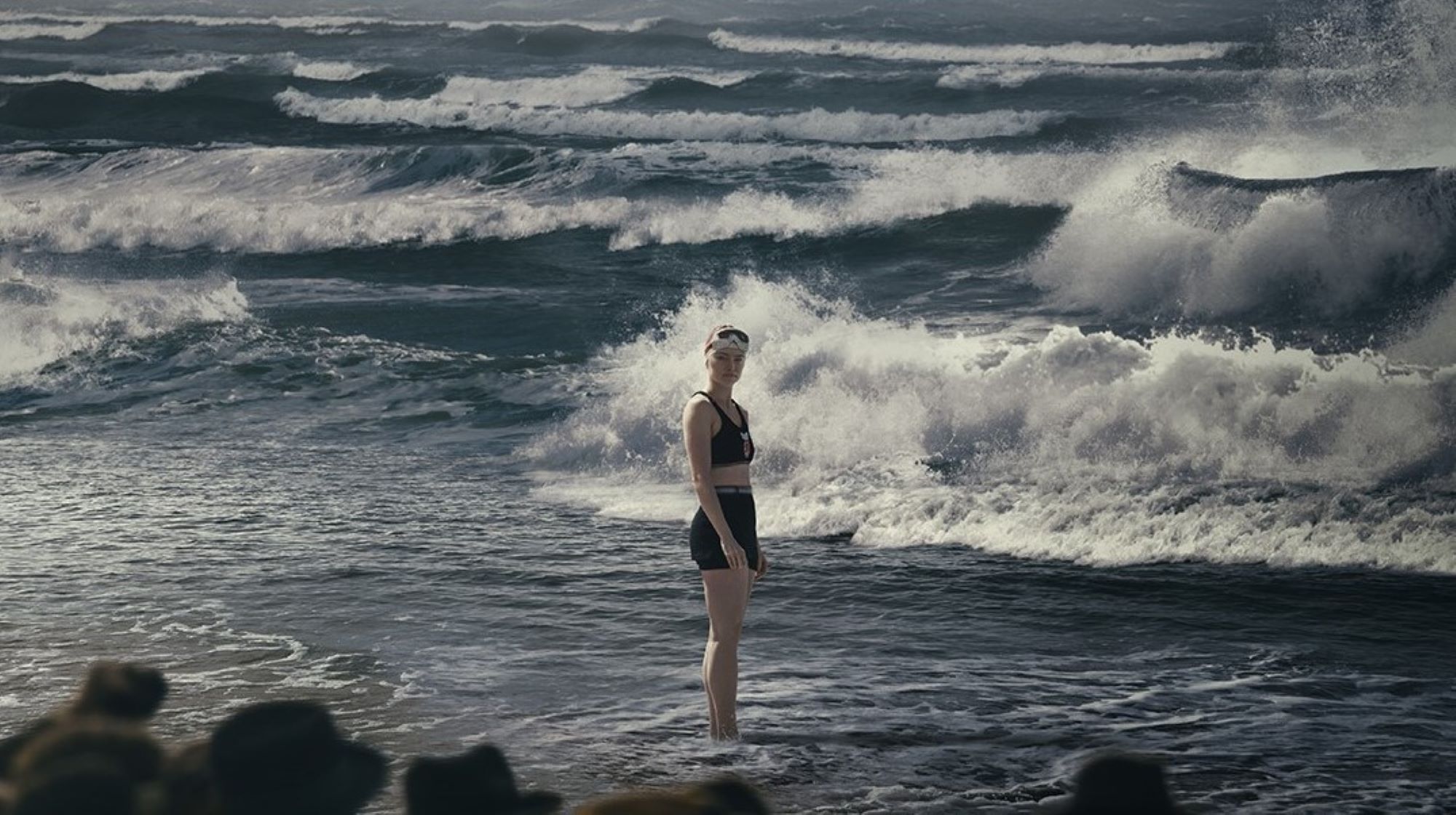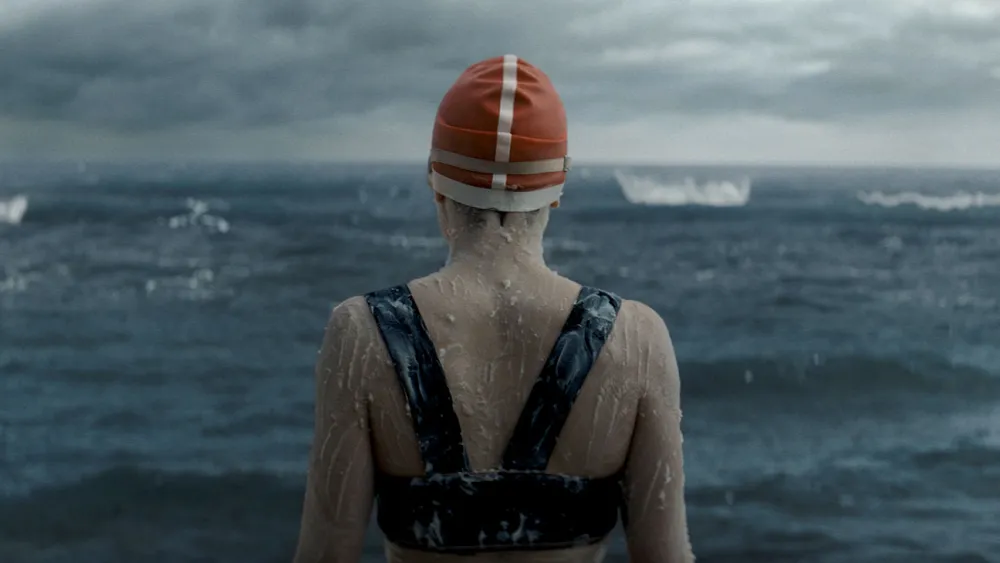
Daisy Ridley in Paint-by-Numbers Inspirational Biopic: Review
Gertrude Ederle loved the water. “To me, the sea is like a person — like a child, I’ve known a long time,” she once said. “ I never feel alone when I’m out there.”
That comfort combined with a dogged sense of determination led the young German American swimmer (played here by Daisy Ridley) to defy odds and sexist naysayers. In 1926, Ederle swam the English Channel in 14 hours and 31 minutes, beating the previous world record, which was held by a man. Her accomplishments helped change perceptions about women in competitive sports. When Ederle returned to New York, the city feted her with a parade on a scale never seen before (or since). They cheered her homecoming and dubbed her the Queen of the Waves.
Like all trailblazers, Ederle’s story began with obstacles and hostility, many of which director Joachim Rønning accords appropriate levels of respect in Young Woman and the Sea. The serviceable feature, whose screenplay is written by Jeff Nathanson, and based on the book of the same name by Glenn Stout, traces Ederle’s inspiring journey from childhood swims around the Coney Island pier to her defining confrontation with the English Channel waves.
Rønning, a frequent Disney director whose credits include Maleficent: Mistress of Evil and Pirates of the Caribbean: Dead Men Tell No Tales (with Espen Sandberg), leans hard into the uplifting notes of the film. A soaring, string-heavy score composed by Amelia Warner assumes the role of emotional supervisor early on, calibrating our mood to triumph and tragedy.
There’s no shortage of shots (DP Oscar Faura) of Ridley, staring across bodies of water with awe and severity. Her shoulders rounded, poised to dive at a moment’s notice. While there’s some poignancy to these bits, most of the emotional profundity is undercut by Nathanson’s by-the-book screenplay. The delicate dramatic threads and subtext of Ederle’s life, then, like Netflix’s recent Nyad, become subsumed by Young Woman and the Sea’s blunt approach to storytelling.
From a young age, Trudy defied the odds. Nathanson and Rønning move efficiently through her early life. We meet the swimmer in 1914 as a bedridden child battling measles. Her parents worried she might not survive, brace themselves to lose a daughter. But Trudy pulls through and as soon as she has recovered, her mother, Gertrude (Jeanette Hain) tasks her father Henry (Kim Bodnia) with teaching young Trudy how to swim. Gertrude’s desire stems from a fatal accident, in which a ship full of women died because they couldn’t swim to shore. Because Trudy had measles, she was not allowed in public pools. She learns to swim in the Coney Island pier, which establishes her relationship and comfort with rougher waters.
The action in Young Woman and the Sea properly kicks off when Gertrude enrols Trudy and her sister Meg (Tilda Cobham-Hervey) in competitive swim lessons as soon as women are allowed. A critical thread throughout Rønning’s film is the instrumental role Trudy’s mother had in her life. The two share a similar kind of determination, with neither willing to take no for an answer.
Trudy doesn’t give up when Charlotte Epstein (Sian Clifford), the women’s swim coach who goes by Eppy, initially doesn’t let her practice with the other girls. Instead, she petitions for an opportunity and eventually becomes the best swimmer on the team.

Ridley holds her own as Trudy. She plays the character’s awkwardness and introversion in a way that recalls the protagonist of Sometimes I Think About Dying. The actress gives a convincing physical performance, too, both in the water (with the help of some doubles) and on land.
The accolades soon start coming. Trudy wins local competitions and national ones. Eventually, she’s invited to join the U.S. women’s Olympic team and compete in Paris. These experiences sharpen her visions for herself. As Trudy nurses a dream of swimming the English Channel, her sister Meg conforms to the expectations of her time. She stops swimming, agrees to an arranged marriage and begins working at the family butcher shop.
Ridley and Cobham-Hervey have a natural chemistry, which bolsters the sibling dynamic that becomes the heart of Young Woman and the Sea. Both actresses perform fine and make the most of their characters’ shared screen time. Particularly charming moments include when the sisters conspire to get rid of Trudy’s sour date and later when Meg helps Trudy with her plans to swim the Channel.
The movie maintains a steady pacing, but it picks up once Trudy embarks on her record-breaking journey. Her first attempt to cross the rough expanse is thwarted by a jealous coach (Jabez Wolffe) and the sexist president of the athletic union (Glenn Fleshler). Trudy finds a partner in Bill Burgess (Stephen Graham), an eccentric man who successfully crossed the Channel. There’s a spark when Ridley is on screen with Graham. Their shared moments clarify different layers of Trudy’s personality, especially the part of her that embraces challenge.
Those scenes are among the few times Young Woman and the Sea overcomes its wooden narrative. The overworked screenplay doesn’t strip the film of all its merits — there’s plenty here in terms of uplift and inspiration for most audiences — but it does make one wonder about a version of this project that embodied the fluidity Ederle felt in the water.

Ms Jung So-min is an Author from south Korea for Lakkars Magazine she is the Head of East Asia.


